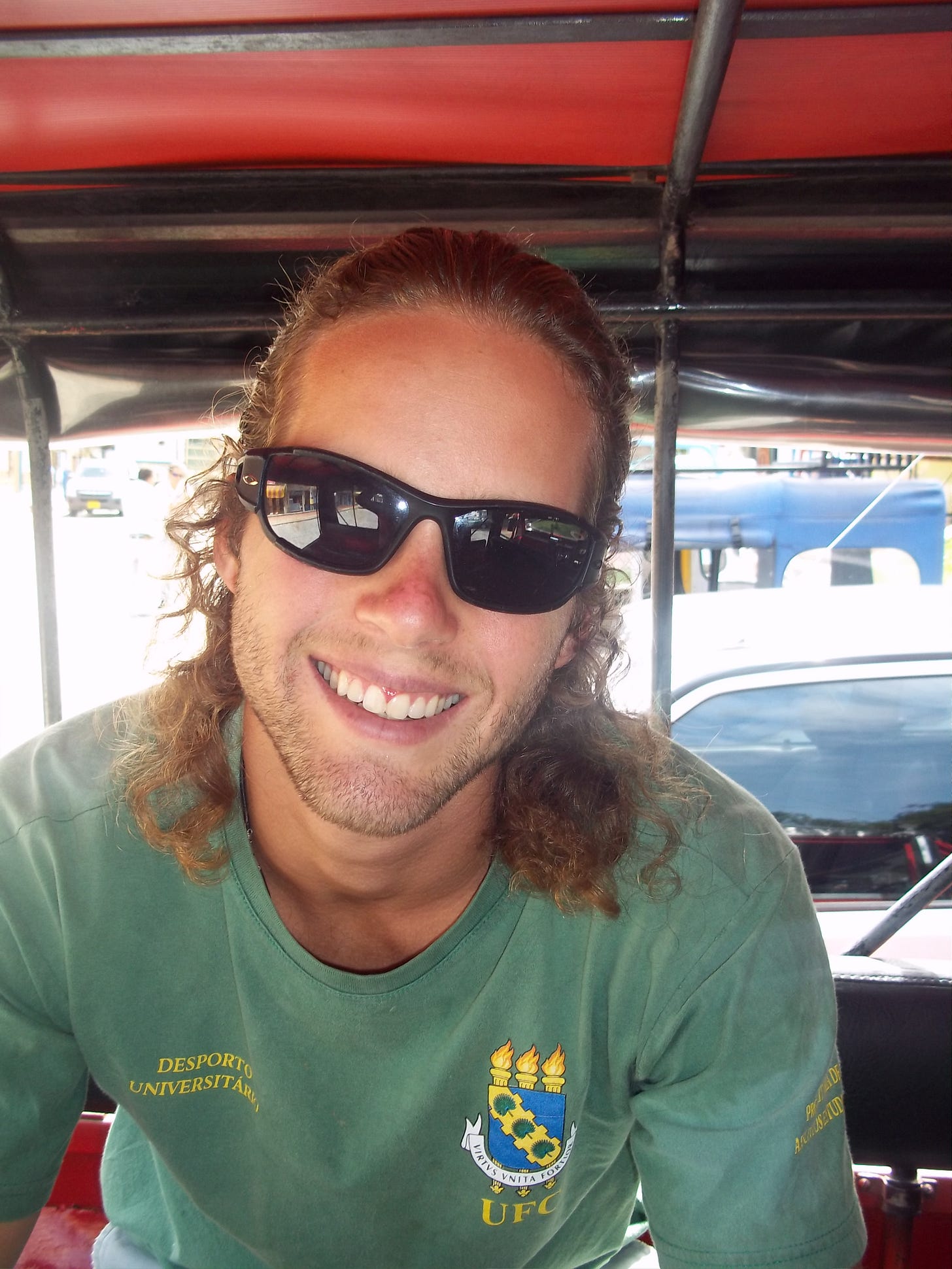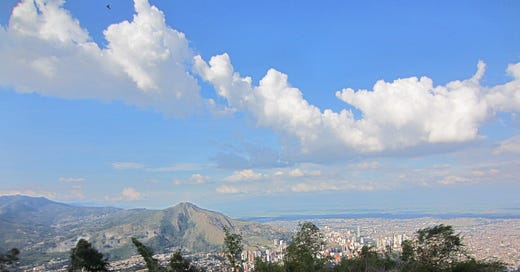Dispatches from Colombia's Zona Roja Pt. 2: Into the Barricades
The turmoil across Colombia worsened as I hitchhiked to Cali. At guerilla-controlled roadblocks, I pretended I was a Brazilian national engaged to a Colombian.
Part II: Into the Barricades
With my backpack over my shoulders, I descended to the lobby with Katerina to meet the other Caleños who would take a truck with us to the roadblock.
Our travel companions included a young woman who had been visiting family in Ecuador, a taciturn middle-aged man whose story I never learned, and a thirty-something businessman returning from a work trip in Ecuador.
The businessman, Alex, was a towering Black man built like a Steelers linebacker. He was twice the size of anyone in Nariño, who were of Andean Indigenous stock. The rest of us tacitly acknowledged him as the leader of our motley band.
Alex collected pesos from us to pay the driver, and our group piled into the bed of a pickup with half a dozen other Colombians. A young man beside me wore a bandana over his face and gripped a stick of rebar like a crude spear.
The drive was about two hours. I sat squished between humanity on all sides, and the wet alpine air soaked my clothes. We drove along serpentine roads, winding past scarlet quinoa fields, white-washed villages, and tree tomato groves.
When we arrived at the roadblock, I saw a sea of campesinos before the barricade of wooden pallets, barbed wire, and cinderblocks. Hundreds were encamped on the highway. Women stirred stews in cauldrons over open fires and doled it out to campesinos holding plastic bowls. Many of the protestors carried wooden cudgels, their symbol of the protest. Some carried rebar, machetes, or metal pipes.
We exited the truck at the edge of the crowd and walked to the barricade. Protesters stepped aside for Alex. As he would do several times in the ensuing days, he spoke to the men guarding the barricade, explaining that we were civilians trying to get to Cali. He prefaced his request for passage with support for the protest, throwing in a “Santos es un hijueputa”—Santos is a motherfucker.
“Don’t say you’re American,” he warned me. “If anyone asks, you’re Russian. The guerrilleros are Marxists and like Russians.”
His point was valid. The U.S. had pressured Santos to pass the hated trade agreement, and the protesters cursed los malditos yanquis—goddamn Americans—almost as vitriolically as they did Santos.
I pretended I was Brazilian. My charade was somewhat convincing: I had spent two years in Brazil, and my strained Spanish sounded like Portuguese. Colombians knew that southern Brazilians had European features, and I wore a tattered São Paulo Football Club jersey I had picked up in the Amazon.
The rumors about bus services beyond the roadblock were false. The protests were intensifying, and campesinos had erected more barricades farther up the highway.
We conferred with other marooned travelers. As in Ipiales, rumors about buses just up ahead fanned desperate hopes. The Colombians murmured that lines were likely running to Cali from Pasto, the capital of Nariño.
It was late morning. Pasto was only an hour’s drive under normal circumstances. Alex called a group meeting on the side of the highway, and we resolved to hitchhike.
We walked north through mountain roads for hours, occasionally thumbing down a truck. The equatorial sun burned my face, and my feet blistered in my threadbare sneakers.
We passed a hut by the side of the road and smelled lunch. Alex asked the proprietors, an elderly couple, if we could buy a meal. We sat down on the dirt floor of their home for stew and cups of agua de panela, a refreshing drink of molasses and water.
Something scurried over my feet. I leapt up, splattering stew on myself. The Colombians burst into laughter. It was not a rat, Alex explained, but one of the family’s guinea pigs—a prized Andean delicacy.
Fortified with food, we resumed the trek. We caught a few rides, but barricades stymied us every few miles. The guards were usually half-drunk campesinos wrapped in Andean ponchos and brandishing wooden staffs and machetes. Sometimes, they were armed guerrilleros in military fatigues and bandanas over their faces.
As Alex spoke with them, I tried to stay out of sight. “Don’t open your mouth at the roadblocks, Johnny. Not even a word,” he told me. Katerina gave me a hat and sunglasses to conceal my face, and Alex carried my camping backpack to make me look less conspicuous. I prayed on a rosary in my pocket at each roadblock.
At sunset, we were still deep in the hinterland. The Colombians grew anxious as nightfall approached, and we decided to look for lodging. “These roads will be full of bandits after dark,” Alex said.
In the gloaming, we saw a handsome village in a valley below the road. Soft lights from clusters of houses on the mountain slopes twinkled in the dusk. A stately granite cathedral crowned the central plaza.
We found the village priest and asked to sleep in the church. He was sympathetic and offered room and board, suggesting that we attend Mass in exchange for the hospitality.
After evening Mass and a light dinner, the priest handed us foam mats, and we clustered on the floor of the rectory for a couple of hours of sleep. Alex roused us before dawn to hit the road again.
We caught several long rides and made it to Pasto before noon. Even from the outskirts, the city looked like a war zone. Protesters swarmed by the thousands, and smoke choked the air. On the way to the bus station, we passed the blackened carcass of a torched semi-truck.

As we passed through the crowds, Alex surreptitiously gripped the wooden handle protruding from his pocket. He had stolen a kitchen knife from the church.
Two teenage boys in front of us were attacking a vehicle. The driver was hemmed in by crowds, and the kids attempted to smash his windows. One of them leaned down to sharpen a shank against the street curb. The driver saw an opening in the crowd and floored it.
We reached the bus station, guarded by a squadron of police and sheltered from the pandemonium. But more grim news came once we arrived: All bus services out of Pasto were canceled until further notice. The roads were too dangerous.
We languished in the station all afternoon, praying a bus company would change its mind. I resigned myself to the possibility of having to sleep in my plastic chair.
Late in the afternoon, I heard a commotion as Colombians ran for the gates. “There’s a bus! There’s a bus!” Katerina screamed.
Our escape vehicle was a bus pirata—a rickety old school bus painted in pastel colors. It wasn’t operated by any official company. From what I gathered, a local entrepreneur figured he could make a quick buck by taking a risk the bus companies wouldn’t.
The driver agreed to take us to Popayán, the capital of the department of Cauca. I rolled my eyes when the Colombians said that buses to Cali were surely running from Popyan—this was the third time I’d heard that wishful claim. But staying in Pasto was out of the question.
The bus was crowded and sweltering, but the mood was merry. We would soon be in Cali! Our troubles were behind us! The driver blasted salsa, and a bottle of aguardiente went around.
The levity soon evaporated when a convoy of soldiers on the highway flagged us down. The driver got out, and an argument broke out between him and the soldiers. The other passengers began to grow restless.
A young man seated behind me started hassling me. “I have no idea where you’re from, caballero,” he snarled. “Maybe the United States, maybe England, maybe Brazil—I don’t give a shit. Either way, you’re a guest in Colombia. Why don’t you show some respect and pay our bus fare?”
I tried to stay calm and deflect the hostility. “Caballero, I need to save my money for the women in Cali,” I said. “But I’ll buy beers when we get to Popayán.” The Colombians appreciated this retort, and someone told the belligerent passenger to fuck off.
When the driver returned, he looked shaken. “I’m sorry,” he said, “but I can’t go any farther. The roadblock ahead is controlled by guerrilleros, and the military is preparing to clear it. It’s too dangerous to continue.”
The Colombians exploded in rage. The man who had accosted me was now in the driver’s face, screaming curses and demanding a refund.
I regrouped on the highway with Alex and the group. For the first time, Alex looked afraid.





this part is wild bro haha
This looks absolutely insane! Thank you for continuing to share this incredible content.